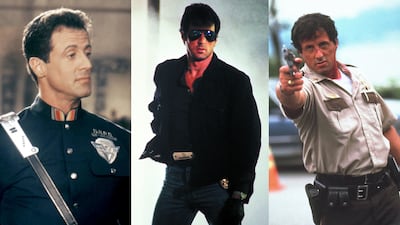This week, we honour one of Hollywood’s original action heroes.
American actor Sylvester Stallone turned 75 on Tuesday and, in typical fashion he enjoyed some low-key festivities before heading back to the gym, as seen on his Instagram.
After all, he's a busy man: he is already at work on the fourth instalment of The Expendables, in addition to penning the script for a possible Creed III, which would form the ninth film from the Rocky series. While Stallone said 2019’s Rambo: Last Blood would be the last, it is no mistake he left the ending ambiguous in case he felt the urge to blow up a few more bad guys in a potential sixth outing.
And who could blame him?
Ever since his star-making turn as “the people’s champ”, Rocky Balboa, in the first Rocky film in 1976, Stallone has built a dependable career by giving generations of viewers exactly what they crave.
Yet, despite the 17 combined films from the The Rocky, Rambo and The Expendables series out of his total output of 86 acting credits on IMDb – which equates to about 19 per cent of Stallone’s filmography – there are more than a dozen other cinematic gems worth exploring.
These titles portray an artist, who despite his singular vision to please the audience, is prepared to take the occasional risk.
Here are five Stallone films worth watching that are not part of The Rocky, Rambo and The Expendables franchises.
1. ‘Nighthawks’ (1981)
This gritty drama just gets better with time. This is mostly down to the fact it was originally written by David Shaber as the third instalment of the hit crime series The French Connection.
With Gene Hackman refusing to return as the film’s lead character, detective Jimmy "Popeye" Doyle, the character's cold-eyed menace and anything-it-takes attitude was transferred to Stallone's Sergeant Deke DaSilva with the script refashioned as Nighthawks.
This was Stallone’s first starring role as a policeman and it remains a career rarity, with a performance stripped of the unnecessary swagger deployed in future cop roles.
DaSilva is tough, but ultimately spooked by his nemesis, Wulfgar (Rutger Hauer), a terrorist intent on wreaking havoc across New York City. That winning mix of vulnerability and brawn gives the film its edge.
2. ‘Cobra’ (1986)
Stallone’s gift remains his unerring focus on giving the crowd what they want. Such is the case with Cobra, a box-office hit and one whose critical appraisal was as vicious as the violence on screen.
By this stage, Stallone had developed a reputation for either writing his own scripts or moulding others to suit his liking.
If you can believe it, Cobra was reportedly Stallone’s original vision for Beverly Hills Cop, which he was initially offered before Eddie Murphy.
After taking the script and removing all traces of hilarity, the producers wisely realised he was not the guy for the project and opted for Murphy instead. So Stallone took the rejected ideas and wrote Cobra instead.
It’s a lean and mean crime drama following no-nonsense cop Marion "Cobra" Cobretti (Stallone), who is investigating a killer cult.
The film was pillaged by the press, but the audience loved it. You can see why: it is the perfect kind of brutal escapist fun expected from 1980s action films.
Cobra found new life recently after its streaming rights were acquired by Netflix.
3. ‘Over the Top’ (1987)
You can just picture the pitch: “I want to create a film like Rocky,” Stallone would say to grinning executives, before saying: "but set in the world of an arm wrestling competition".
Any sceptical gazes thrown at Stallone wouldn’t have mattered.
Coming on the back of blockbuster successes of 1985’s Rambo: First Blood Part II and Rocky IV, and Cobra, Stallone could have written a cop comedy with an elderly relative as his partner and it would have gotten made (he eventually did do that, with 1992’s Stop! Or My Mom Will Shoot).
While Over the Top sunk at the box office, the film remains a good watch, not because of the grunting and vein-popping scenes of arm-wrestling bouts, but thanks to the tender exchanges between Stallone's character Lincoln Hawk and son Michael (David Mendenhall), who go on a road trip to get to the competition.
4. ‘Demolition Man’ (1993)
After a few lame efforts, Stallone finally delivered his best comedic role with Demolition Man.
Set in 2032, Stallone is the disgraced cop John Spartan, unlocked from a cryogenic cell after spending three decades there for past mishaps on the job.
Assigned to track the ruthless killer Simon Phoenix (Wesley Snipes), he marvels at the sterile and ultra-civil society Los Angeles (now San Angeles) has become.
While occasionally poking fun at himself, this is the first time Stallone went all-in and allowed himself to be ridiculed as a “dinosaur” in the futuristic film’s settings.
It’s a shtick Stallone eventually took to meta levels with The Expendables series, alongside his cast of fellow ageing 80s action stars.
5. ‘Cop Land’ (1997)
Key to Stallone's appeal is him taking on roles of the everyday man. It's a deep-seated connection often channelled through his melancholy eyes, as opposed to the muscles he's most famous for.
Academy Award-nominated director James Mangold knew this and often kept the lens tight on Stallone's haggard face as he plays a partially deaf sheriff caught in a case of police corruption.
This is the rarest of Stallone films in that it lacks extravagant action sequences and he is part of an ensemble cast featuring Robert De Niro, Harvey Keitel and Ray Liotta.
With such company, Stallone rises to the occasion to deliver one his most powerful and tortured performances.
And for once, the majority of critics called it a knock-out.


